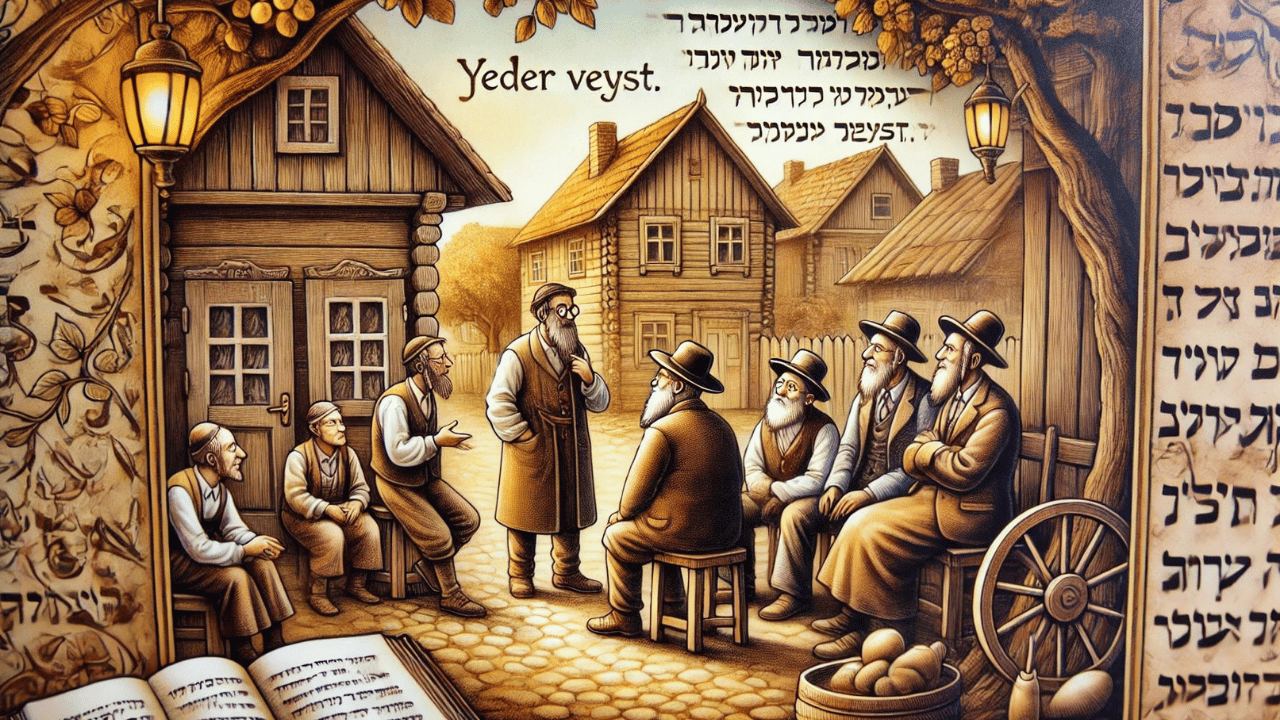Yiddish, the language traditionally spoken by Ashkenazi Jews, is rich in cultural history, brimming with colorful expressions and phrases that capture the complexity of Jewish life. One such phrase, “Yeder Veyst,” has an intriguing meaning and origin that offers insight into the wit and wisdom of Yiddish culture. In this article, we will explore the meaning of “Yeder Veyst,” its origins, and how it is used in daily life to convey humor, irony, or truth.
What Does “Yeder Veyst” Mean?
At its core, “Yeder Veyst” translates to “Everyone knows” or “Everyone knows this” in English. The phrase is a reflection of a universal truth, often used to indicate that something is so well-known or so obvious that it doesn’t need to be explained further. In many cases, it is used with a bit of irony or humor, as if to say, “This is common knowledge, why are we even discussing it?”
In typical Yiddish fashion, the phrase is not just about sharing a fact but often has an underlying tone of playful sarcasm. For instance, if someone states the obvious or speaks in a way that seems overly formal or unnecessary, a response of “Yeder Veyst” can quickly deflate the conversation, implying that everyone already knows the point being made.
Origins of the Phrase
Yiddish originated in the Ashkenazi Jewish communities of Central and Eastern Europe. It is a Germanic language that incorporates elements from Hebrew, Aramaic, and Slavic languages. Over centuries, the Yiddish language developed into a vibrant and expressive means of communication, often used to express humor, warmth, and wisdom. Many Yiddish phrases have become deeply ingrained in Jewish culture, particularly in storytelling and everyday conversation.
The phrase “Yeder Veyst” is a classic example of how Yiddish speakers often used humor and wit to convey truths about life. The use of the word “Veyst” (which comes from the verb “vayzn” in Yiddish, meaning “to know”) ties directly to the Jewish cultural value of shared knowledge and communal experience. Jews, particularly in Eastern Europe, have a long tradition of community-based living, where shared knowledge and mutual understanding were key elements of daily life. “Yeder Veyst” encapsulates that communal wisdom, often used to remind others of the obvious or the expected.
How is “Yeder Veyst” Used in Conversation?
“Yeder Veyst” can be used in a variety of situations, usually as a response to something that is perceived as common knowledge or a statement that doesn’t add much new information. Here are some examples of how it might be used:
-
In Response to the Obvious:
Imagine someone says, “We need to eat lunch today.” A person who is aware that everyone has been thinking about lunch for hours might respond with a casual, “Yeder Veyst!” to humorously point out that this is, indeed, an obvious statement. -
As a Sarcastic Remark:
If someone speaks in a way that feels overly pedantic or self-important, a quick “Yeder Veyst” can be a playful way to acknowledge the statement while also poking fun at how unnecessary or obvious it is. It’s often used with a tone of playful sarcasm. -
When Expressing Shared Understanding:
In some situations, people may use “Yeder Veyst” as a way of acknowledging mutual knowledge or experience. For example, if someone is discussing a shared family tradition or a well-known historical event within the community, they might use “Yeder Veyst” to affirm that everyone is already familiar with the topic. -
In Storytelling:
Jewish storytelling, which often includes humor and exaggeration, sometimes features characters who use “Yeder Veyst” to illustrate their deep understanding of a situation or a shared cultural experience. It can be a humorous device in a story where the character highlights something that seems too obvious to explain.
Cultural Significance of “Yeder Veyst”
Like many Yiddish phrases, “Yeder Veyst” holds deeper cultural significance beyond its literal meaning. It reflects the communal, often humorous nature of Jewish life, where shared experiences and a sense of collective wisdom form the foundation of everyday interaction. The phrase also highlights the Jewish approach to language—one that is often infused with irony, wit, and a healthy dose of self-awareness.
In Jewish communities, there is often an emphasis on “knowing”—whether it’s knowledge of history, tradition, or simply the inside jokes that are shared among people of the same cultural background. “Yeder Veyst” plays into this idea, acknowledging the fact that many truths or realities are so universally understood within the community that they don’t need to be spelled out. It’s a way of marking the shared understanding that exists without needing to elaborate on it.
“Yeder Veyst” in Popular Culture
While “Yeder Veyst” is traditionally a Yiddish phrase, its usage has spread beyond just Jewish communities. In the modern world, especially in New York and other areas with large Jewish populations, many non-Jewish people have adopted Yiddish expressions, including “Yeder Veyst,” into their daily language. The rise of Jewish-themed television shows, movies, and books, as well as the increased popularity of Jewish culture, has brought phrases like “Yeder Veyst” into the mainstream.
For example, in popular TV shows like Seinfeld, The Marvelous Mrs. Maisel, and Unorthodox, Yiddish expressions often make their way into the dialogue, reflecting the cultural heritage of the characters. “Yeder Veyst” might be heard in moments of humorous realization or self-awareness, especially in contexts where a character is pointing out the obvious or delivering a sharp comment about a situation.
Conclusion
The Yiddish phrase “Yeder Veyst” is a perfect example of the wit and cultural richness of the Yiddish language. Translating to “everyone knows,” it captures the Jewish tradition of humor, irony, and shared understanding. Whether used sarcastically, humorously, or simply to acknowledge common knowledge, “Yeder Veyst” has become a beloved part of the Yiddish lexicon that continues to resonate within both Jewish communities and beyond. Its usage speaks to a deeper connection to shared experience and cultural wisdom, offering a reminder that sometimes the most obvious truths are the ones worth acknowledging.
